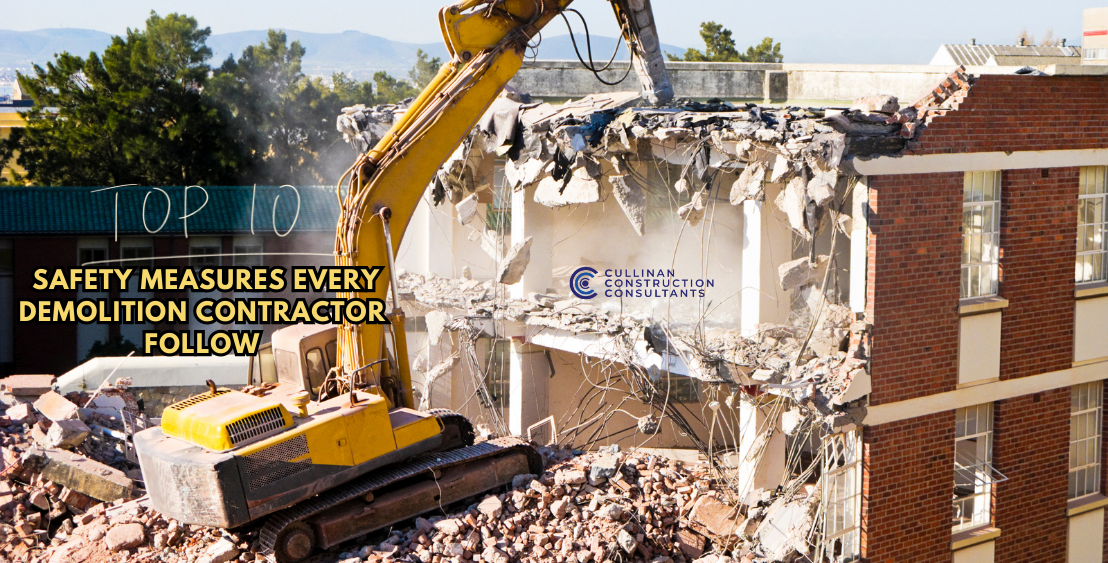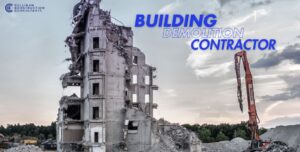Top 10 Safety Measures Every Demolition Contractor Should Follow

For structures that are to be demolished, safety is always the first thing that ought to be considered. Demolitions pose certain threats no matter whether one is engaged in residential or commercial projects. Professional demolition experts must follow strict safety management practices to protect their personnel, other facilities and nature as well. Safety is one of the core principles of providing demolition consulting services at Cullinan Construction Consultants and therefore every project is carried out with the available risks eliminated.
In this blog, we will discuss the top 10 safety measures every demolition contractor must adhere to, with a synopsis of each one and the importance it plays in ensuring that the demolitions are carried out properly and without the risk to safety.
1. Comprehensive Site Assessment
Site assessment is the first and most important measure that must be taken before any sort of demolition is started. It does not matter whether you are a residential demolition contractor or busy with large commercial buildings, you need to know where the premises are enclosed by and what risks they pose. An accurate site survey facilitates the identification of hazardous materials, among other defects, meaning those containing asbestos, those that may be structurally unsound, and the limited distance between the buildings in a vicinity, to mention a few.
2. Proper Permitting and Compliance
No demolition project can commence without obtaining the minimum statutory approvals. Such approvals must include approval for the building as well as approvals necessary for the environment where cases of hazardous materials like asbestos exist. Legal compliance is fundamental all the time especially to avert delays in delivery or costs in terms of fines. Meeting all the project’s legal obligations is part of why professional demolition contractors are hired.
At Cullinan Construction Consultants, as demolition permitting consultants, diligent efforts ensure that all required documentation is obtained and every project meets UK laws and local bylaws.
3. Hazardous Material Identification and Removal
In most demolition processes, one of the safety precautions that are usually carried out is the identification and elimination of such materials as rough asbestos, lead or mold. Such materials if not properly managed pose health threats not only to the workers but also the people who live around the area. It is important to note that demolition specialists should be well-trained in the safe handling of these materials and the disposal of them according to the law and under CDM 2015.
When using a registered demolition contractor like Cullinan Construction Consultants, you will be able to accurately identify and eliminate all hazardous materials before the demolition commences.
4. Personal Protective Equipment (PPE)
It is acknowledged that demolition sites can be quite hazardous and workers require protection. Building demolition contractors have to guarantee the wearing of personal protective equipment (PPE) for every worker of their team which includes headgear, shin guards, finger protectors, eye shields, fluorescent jackets, shoes with metal soles and masks if there are poisonous chemicals.
Cullinan Construction Consultants places great importance on safety as we carry out our role as demolition consultants, and all people in touch with the site are compliant with protective gear standards to minimize incidences and injuries.
There is always a possibility of accidents occurring at demolition sites if adequate precautionary measures are not observed. In this case, using any lifting equipment can lead to grave injuries if it has not been taken good care of. If any machinery is in adverse conditions, mechanical problems may arise when carrying out demolition and such deterioration warrants repairs and service to the equipment. Residential demolition contractors should ensure that everyone involved in the demolition maintains the necessary safety standards since every inch of any construction site is full of danger.
Cullinan Construction Consultants also understands the importance of each piece of equipment that is being operated in our projects and such integrity is enhanced by regular safety checks and servicing all equipment to make sure that there is a lower risk of misfortunes.

5. Communication and Coordination
Communication should be taken seriously when it comes to the demolition of structures. This aspect is even more important in any undertaking when a few crews are engaged in the demolition. It does not matter whether you are in a residential demolition contractor mode or on huge commercial demolitions, it is very crucial to ensure there is communication between the workers, the supervisors and the engineers. Safety huddles conducted in the course of the job or at intervals also help keep all the staff present on the site regarding the dangers present and their responsibilities in such an area.
6. Evacuation and Emergency Preparedness
It is acceptable to claim that a demolition team may be fully equipped at all times during the demolition process. However useful the plans for carrying out demolition are, a disaster can occur. Every single demolition contractor must be prepared for such scenarios with utmost importance and thus an emergency plan needs to be written concerning which areas to evacuate, where to do first aid and whom to contact in case such events or collapses occur at a structure. Teaching the employees how to perform the tasks of evacuation as well as giving them first aid are again some of the strategies that need to be included.
7. Continuation of Training and Audits of Safety
Safety is not a one-time effort in any accident prevention or control program. It aims to enforce the continuing enhancement of safety measures. Workers responsible for demolition such as demolition specialists should undergo training under safe demolition conditions every so often. Finally, there ought to be periodic safety audits performed on the teams to ascertain that any such activities are being carried out adequately and that the hazards can be addressed in time.
While working at Cullinan Construction Consultants, we ensure that all our employees are regularly trained on safety instructions and performance of the highest possible number of audits of ongoing projects. This drive for improvement is the reason we occurs at the top of the demolition contractors UK.
FAQs
A demolition company specialises in safely dismantling and removing buildings, structures, or specific parts of properties. Their services include site preparation, structural demolition, hazardous material removal (like asbestos), and debris cleanup. They use specialized equipment and techniques to ensure efficiency and compliance with safety regulations, paving the way for new construction or land redevelopment.
In the UK, demolition permits are required for most if not all demolition sites especially the ones involving large structural buildings or regulated siting. The processes involved include preparing and submitting design documents to the local authorities to include safety, environmental, and waste management plans under CDM regulation. As demolition permitting consultants, Cullinan Construction Consultants assists clients with obtaining the permits that relate to building construction and the requirements of both the local and national jurisdictions.
CDM “Construction Design and Management 2015” is a regulation that manages the health and safety of construction projects. It applies to all building works, including new build, maintenance, and demolition.
All the demolition works are covered under CDM 2015. It applies to any size and duration of building project.








Comments are closed